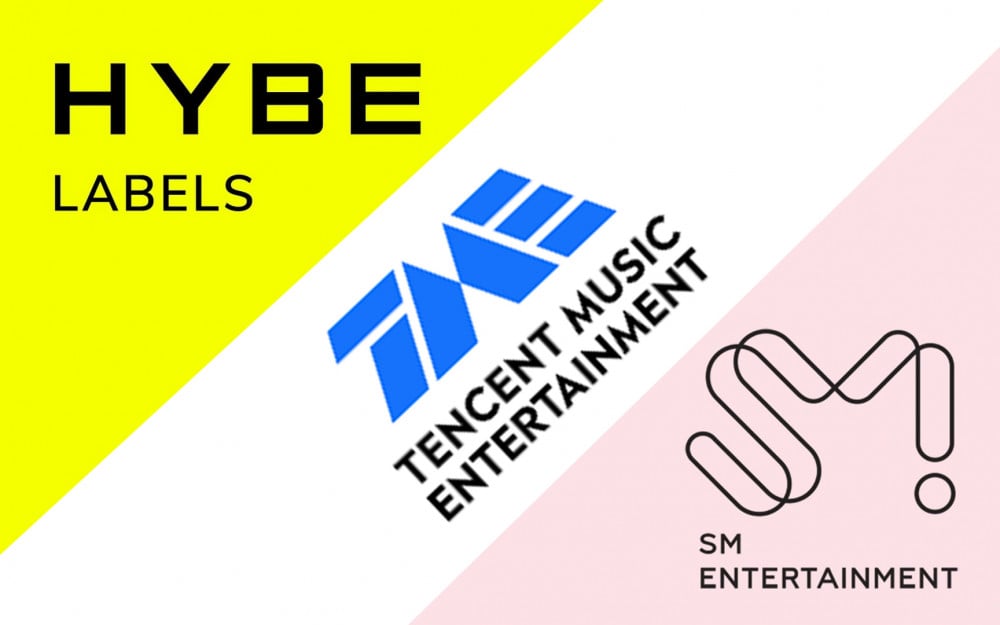
HYBE has initiated its exit from SM Entertainment, aiming to recover its investment by selling all its SM Entertainment shares to the Chinese company Tencent Music Entertainment.
According to the Financial Supervisory Service’s electronic disclosure system on May 27, HYBE plans to complete the sale of its remaining stake in SM Entertainment within this month. Having sold off the shares it acquired during the management rights battle with Kakao over the course of a year, HYBE is expected to finalize the exit process by selling the remaining shares on the 30th.
HYBE first invested in SM Entertainment back in 2023. At the time, it purchased approximately 15% of SM shares from its largest shareholder, Lee Soo Man, aiming to gain management control. Including a public tender offer, HYBE invested around 450 billion KRW (327 million USD).
However, the situation changed drastically when Kakao competed with HYBE in the SM acquisition race, offering 150,000 KRW (109 USD) per share, 30,000 KRW (21.80 USD) per share higher than HYBE’s tender offer. Given SM’s stock price of 80,000-90,000 KRW (58.13-65.40 USD) at the time, Kakao paid roughly a 60% premium.
HYBE ultimately withdrew its bid to acquire SM and sold approximately half of its shares to Kakao through a tender offer. In exchange, it secured an agreement for SM artists to join its platform, Weverse, opting for practical benefits over a costly winner-takes-all fight. At the time, HYBE Chairman Bang Si Hyuk said at the Kwanhun Forum, “We couldn’t proceed with the (SM) acquisition at the cost of disrupting market order,” and added, “I’m satisfied that we reached an agreement on the platform, which will become increasingly important in the future.”
After Kakao was confirmed as the new largest shareholder of SM, uncertainties over control were resolved, and SM’s stock price dropped sharply. Compounding this, former executive producer Lee Soo Man exercised his put option to sell all of his remaining SM shares per a shareholder agreement, which forced HYBE to spend an additional 100 billion KRW (72.7 million USD).
Though HYBE still held around 12% of SM, its ability to influence management became practically impossible with Kakao as the largest shareholder. Holding these shares became burdensome, so HYBE adopted a wait-and-see strategy rather than making a rushed move.
In May 2024, HYBE sold part of its stake via a block deal at around 90,000 KRW per share, reducing its stake to below 10%. HYBE plans to sell the remaining 9.38% to Tencent Music Entertainment (TME) on May 30. The timing appears to align with the recent spike in SM’s stock price amid growing expectations over the potential lifting of China’s Hallyu (K-pop) ban.
The sale to TME includes a roughly 15% discount compared to the previous day’s closing price. Analysts suggest this higher discount was due to the lack of management control and the fact that TME would only become the third-largest shareholder after Kakao and Kakao Entertainment. A large-scale sell-off in the open market could have dragged SM’s stock price down, further justifying the block deal.
HYBE’s total investment in SM amounts to 555 billion KRW (approximately 403.3 million USD), while its total return is estimated to be about 560 billion KRW (approximately 407 million USD), 5 billion KRW (3.6 million USD) higher.
A HYBE representative stated, “This is part of our strategy to focus on core business areas, and the funds recovered will be used to secure future growth engines.”
This latest news has sparked another popular debate in various Korean online forums, with Korean online users expressing interest in Tencent Music’s ownership stake in SM Entertainment.
Korean netizens commented:
“HYBE got greedy and just ended up doing dumb sh*t.”
“Wasn’t it Kakao who manipulated the stock price because they didn’t want to be taken over by HYBE?”
“Tencent…”
“A Chinese company taking over SM stakes…”
“This just seems like a stock-related article. I don’t get why people are mad about it.”
“Isn’t it good for both companies that HYBE is selling all of SM stocks?”
“I guess HYBE needed the cash. Lol.”
“Wow, HYBE managed to recover their investments.”
“In my opinion, Tencent lucked out.”
“Why are they selling to that company? Ugh.”
“Wow, they’re selling part of a K-pop company to a Chinese company… yikes.”
“Did HYBE run out money??”
“Sigh…”
“Lee Soo Man wanted to enter the Chinese market. I guess he got his wish with Tencent. lol.”
SEE ALSO: 10 heartwarming K-Dramas that beautifully portray sign language
This post was originally published on this site be sure to check out more of their content







